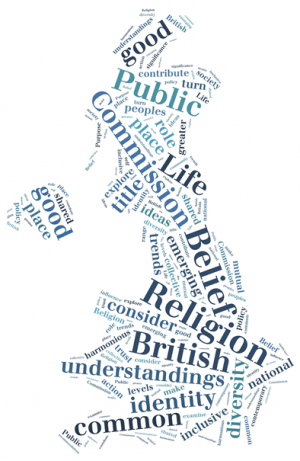
An independent commission established by Cambridge’s Woolf Institute has today published its final report, calling for a ‘new settlement’ in relation to religion or belief in the UK.
Living with Difference: Community, Diversity and the Common Good is the end result of the work of twenty commissioners, including leaders from a range of religions, equality and human rights specialists, and the Chief Executive of the British Humanist Association. Chaired by the Rt Hon Baroness Butler-Sloss of Marsh Green GBE, they spent two years gathering 200 evidence submissions in writing and held oral witness sessions across the UK, in order to make recommendations targeted at policy makers, government officials, religious leaders and the wider public for how policy and practice relating to religion and belief should develop in the UK.
The report draws attention to the way that the religion and belief make-up of British society has changed immeasurably in recent decades. Positive recommendations of the report include:
- ‘Governments across the UK should introduce a statutory entitlement for all schools within the state system for a subject dealing with religious and non-religious worldviews… The content should be broad and inclusive in a way that reflects the diversity of religion and belief in the UK.’
- ‘Governments should repeal requirements for schools to hold acts of collective worship or religious observance and issue new guidelines building on current best practice for inclusive assemblies and times for reflection’
- ‘Government should recognise the negative practical consequences of selection by religion in schools, and that most religious schools can further their aims without discriminating on grounds of religion in their admissions and employment practices, and require bodies responsible for school admissions and the employment of staff to take measures to reduce such selection.’
- ‘State inspectorates should be concerned with every aspect of the life of faith schools, including religious elements currently inspected by denominational authorities.’
- ‘The pluralist character of modern society should be reflected in national and civic events so that they are more reflective of the UK’s increasing diversity, and in national forums such as the House of Lords, so that they include a wider range of worldviews and religious traditions.’
- ‘The BBC Charter renewal should mandate the Corporation to reflect the range of religion and belief of modern society, for example by extending contributions to Radio 4’s daily religious flagship Thought for the Day to include speakers from non-religious perspectives such as humanists.’
- There should be ‘equitable representation’ in hospital and prison chaplaincy services ‘for those from non-Christian religious traditions and for those from humanist traditions.’
BHA Chief Executive Andrew Copson commented, ‘Perhaps no one will agree with every recommendation made today, but they all tend in the right direction, beginning to deal with a transformed social reality in Britain, and acknowledging that public policy has to change to accommodate that reality. It is striking that this report has been composed by so diverse a group and on the basis of so much evidence from an even wider range of religious organisations and other stakeholders. Vital to the future of Britain as a cohesive society will be the ability of people of all religions and non-religious beliefs and identities to act together for the common good.’
Notes
For further comment or information, please contact Campaigns Manager Richy Thompson at richy@humanists.uk or on 020 7324 3072.
As well as its Chief Executive being a Commissioner, the BHA provided written and oral evidence to CORAB.
Read the report: https://corablivingwithdifference.files.wordpress.com/2015/12/living-with-difference-community-diversity-and-the-common-good.pdf
The British Humanist Association is the national charity working on behalf of non-religious people who seek to live ethically and fulfilling lives on the basis of reason and humanity. It promotes a secular state and equal treatment in law and policy of everyone, regardless of religion of belief.
